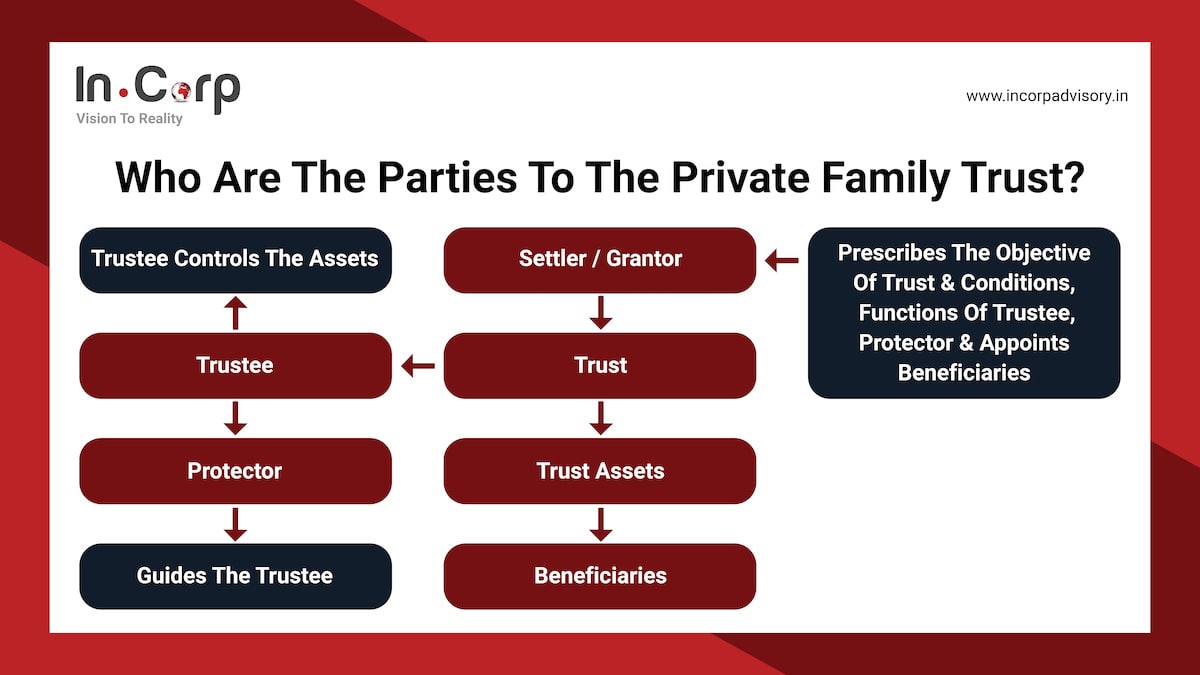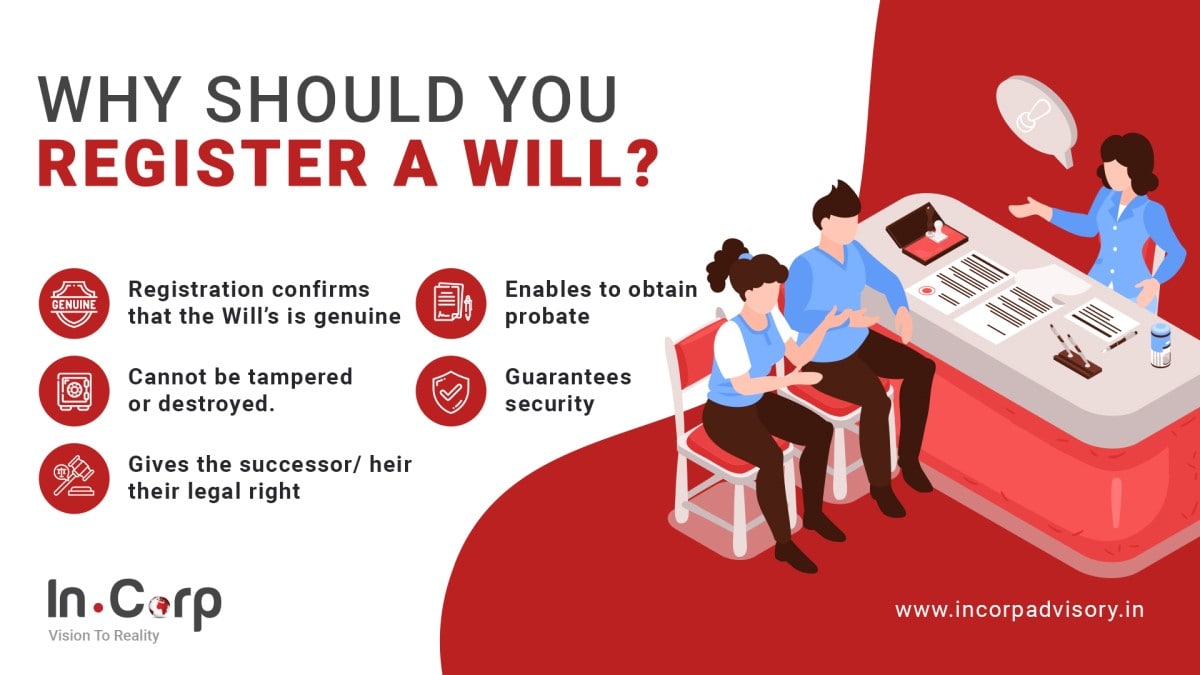This pandemic has taught us to be better prepared for the unseen future. An efficient succession plan addresses current needs and assesses possible tools after considering your specific situations, objectives, and circumstances. The most popular tools when creating a succession plan are Will and Family Trust. Now you may wonder, ‘If you need a Will or a Private Family Trust?’ however, the question should be ‘which tool is the most relevant to your objectives?’ In this article, we discuss the differences between Will vs Trust.
Table Of Contents
When should you consider a Trust?
When should you consider a Will?
What is the difference between Will vs Trust?
What are the general myths about estate planning?
Conclusion
Why Choose Incorp?
Frequently Asked Questions
Considering the objectives narrowed down for your estate planning, there may be scenarios where succession is a better option and some scenarios where Will is better.
When should you consider a Trust?
Let us understand the circumstances where Private Family Trust is an effective tool.
- A Will can be contested when there are ongoing disputes and litigation. Planning your succession through a trust might prove more beneficial since a Will is a document that comes into effect after the lifetime of its creator (known as Testator), who is not present to justify their intentions when disputed.
- Trust is an effective tool to ring fence the wealth for minor and dependent beneficiaries.
- Unlike Will, Trust enables you to distribute your wealth so that minors or young inheritors do not inherit a sizable estate all at once. This may expose them to incorrect influence or imprudent management resulting in erosion of wealth.
- Setting up a Private Family Trust is better if the ownership is complex and spreads out across geographies.
- For confirming the genuineness of Will in the eyes of the Court, it needs to be probated after the death of the will maker. This process may get tedious one. Probate is a public document which might not be preferred by many since it intrudes on privacy. In such a case Trust offers privacy.
- Family trusts may provide continuity to businesses and prevent disruption due to subsequent feuds after the demise of the head of the business/ family.
Related Read: How Can A Private Family Trust Be Beneficial To You?
When should you consider a Will?
Let us understand the circumstances where a Will is an effective tool.
- One can retain control over the assets during his lifetime and may make alterations to Will during his lifetime. Irrevocable trust cannot be altered once set in place. This way, Will is flexible and offers control since it comes in effect only after death.
- A Will shall be practical if you pass on wealth to inheritors residing overseas where estate taxes prevail.
- While a Trust is an all-encompassing estate plan, it is a structure that is far more complicated than a Will and requires considerable planning. Hence, it is always advisable to thoroughly assess the need for one.
- One can also provide guardianship for their children through Will.
- Will is preferred generally for succession planning because of the relative ease and lack of formalism required. Setting up a trust would require engaging a professional to settle and register the trust.
Related Read: What Is A Will And Why Do I Need One Now?
What is the difference between Will vs Trust?
We have prepared a chart below to highlight the differences between a Will and a Trust.
| Key Difference | Will | Trust |
|---|---|---|
| Effective date | After one’s death. | Once signed and funded. |
| Protection during incapacity of donor | No | Yes |
| Need of Probate | Yes | No |
| Ensures Privacy | No | Yes |
| Provides guardianship for minor children | Yes | No |
| Cost and Process | Simple process | Comparatively complex process |
| Contestability | More likely to be successfully challenged. | Unlikely to be successfully challenged due to its ongoing nature. |
| Tax benefits | No | Revocable Trust- No Irrevocable Trust – Yes |
| Protection from creditors to beneficiaries | Depends on facts of case | Irrevocable Trust – Yes subject to certain conditions. |
| Protection during contractual incapacity of the beneficiary at the time of bequest | No | Irrevocable – Yes, if your trust is discretionary and no distribution is being made to a contractual incapable person. |
A Will or Trust, will eventually ensure the transfer of your assets to your loved ones without any hardship to them.
What are the general myths about estate planning?
We discuss a few cases as shown below:
Case 1: I am not wealthy enough to need an estate plan
It may seem like an estate plan is required by a wealthy person. However, everybody needs to have an estate plan since it involves money, car, home, jewellery and assets of sentimental value, especially in your absence! An estate plan is to protect the family in times when they genuinely need it.
Case 2: I am too young to think about estate planning
Even though you are young and in perfect health, unexpected accidental events may occur. Hence, you should be cautious while planning your future. Without an estate plan, it might be difficult to consolidate assets, control over online bank accounts and social media accounts. Hence to avoid chaos, planning becomes essential.
Case 3: Even if I die without an estate plan, my wife and my children will eventually get the assets in my name
When one dies without an estate plan, specific assets may be passed on to undeserving people as per their share under intestacy law. Therefore it is incorrect to assume assets will eventually pass in the right hands without a strong road map.
Case 4: You do not need an estate plan because – Parents/ancestors, joint families and businesses have been passed down and they have survived over generations.
Today, family disputes are the most difficult to handle since they involve dealing with the closest people on the other side of the table. Hence to avoid family disputes, it is crucial to layout estate plans beforehand.
Case 5: Life Insurance is all what one need for estate planning
Indeed life insurance is an essential element of estate planning, it cannot be replaced with the deed of trust or a will completely.
Conclusion
Often due to lack of attention or various other reasons every asset is not placed in the trust thus creating issues later. Wills contain other important provisions such as the choice of guardians of minor children for managing liquid assets. In such scenarios, having both family trust and Will might make better sense.
To summarize, factors determining the tool for succession planning (whether by a making a Will or creating a Trust) includes the following:
- Assets and size of the estate
- Family Dynamics of the donor
- Inheritance objectives – whether business succession is planned for several generations.
- Existing and contingent liabilities of donor as well as family members
Why choose Incorp?
It is always advisable to involve an expert considering sensitivity of the matter. It is unwise to “do it yourself” when the family dynamics, commitments and asset-mix requires professional consultation. We understand that regulatory compliance and succession planning can be complicated. Our dedicated team of family office management experts, legal professionals, tax experts & financial advisors who have the required knowledge and experience are happy to assist you.

